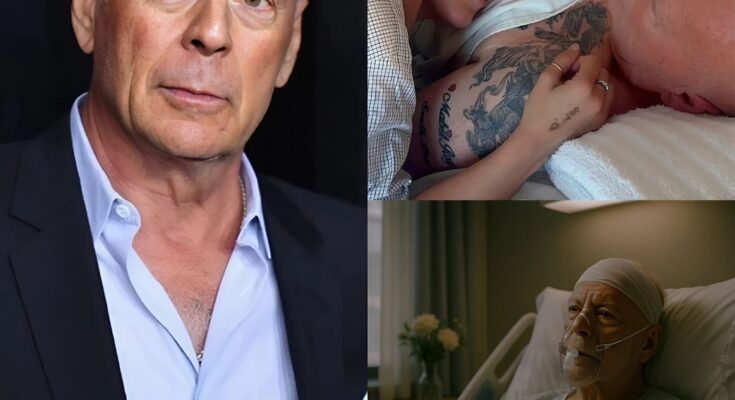hirty minutes ago, in a quiet suburb of Texas, the family of Bruce Willis — legendary actor, cultural icon, and one of the most recognizable faces in Hollywood history — confirmed the news that fans around the world had long dreaded. After a prolonged and painful battle with illness, Willis has passed away, leaving behind not only a grieving family but also millions of admirers across every corner of the globe. For decades, Bruce Willis was the epitome of cinematic strength: the action hero who seemed indestructible, the man whose sly smile and sharp wit carried audiences through explosions, heartbreaks, and triumphs. Yet today, the world finds itself mourning the very human loss of a star who gave everything to his craft and, in the end, quietly faded away surrounded by loved ones.
The announcement came in the early morning hours, Texas time. Family representatives gathered briefly outside the Willis home to confirm what rumors had already begun to circulate. “With deep sorrow and endless love, we must share that Bruce passed peacefully today, held by his family,” their statement read. “He gave us laughter, courage, and unforgettable memories. His light will never dim.” Those words, simple yet profoundly heartbreaking, marked the official farewell to a man whose name was synonymous with Hollywood for over three decades.
For years, fans had been aware of Willis’s declining health. In 2022, the family announced that he had been diagnosed with aphasia, a condition that affected his ability to communicate. Later, it was confirmed that his condition had progressed into frontotemporal dementia, a devastating diagnosis that slowly robs individuals of speech, memory, and independence. His loved ones, including ex-wife Demi Moore and daughters Rumer, Scout, Tallulah, Mabel, and Evelyn, had rallied around him with unyielding support. Social media posts from the family often depicted tender moments: daughters holding his hand, Demi standing close by, his current wife Emma Heming Willis reminding the world of his bravery in silence. Fans knew, painfully, that the journey was coming to an end. Today, that journey has closed.
Almost instantly, tributes poured in. Across Hollywood, fellow actors shared memories of Willis not just as a performer but as a friend. Samuel L. Jackson wrote: “I lost a brother today. Bruce, you made every set brighter, every scene sharper, and every moment unforgettable. Rest in power.” Sylvester Stallone, who fought alongside Willis on and off screen, posted an old photo of them laughing together: “It breaks my heart. He was a true man’s man, and a real friend. The world feels emptier today.”
Fans recalled his most iconic role: John McClane in the Die Hard series, the everyman cop who never backed down, no matter how impossible the odds. With his bloody tank top, his sardonic one-liners, and his refusal to quit, McClane became a symbol of resilience and grit. For many, Willis was McClane, embodying the stubborn determination to fight through even the worst challenges. That image makes today’s news even more devastating, as the man who once seemed invincible succumbed to an illness no action sequence could conquer.
Beyond Die Hard, Willis built an unparalleled filmography: Pulp Fiction, The Fifth Element, Armageddon, The Sixth Sense, Moonrise Kingdom. Each role showed a different side of his talent, from dry comedy to emotional depth to raw heroism. Directors praised his versatility, co-stars adored his generosity. Quentin Tarantino once remarked: “Bruce didn’t just act in my movies; he gave them muscle, soul, and a touch of mischief that only he could deliver.”
But to his family, Willis was more than a Hollywood legend. He was a father who sang lullabies, a husband who offered quiet love, a friend who showed up without hesitation. His daughter Rumer, who had been by his side during his final months, wrote in a heartbreaking tribute: “He wasn’t just my dad, he was my safe place. Even when he couldn’t speak, his eyes told me everything: that he loved us, that he was proud, that he would always be with us.”
In Texas, neighbors recalled seeing him on peaceful walks with Emma, often smiling despite his frailty. One neighbor described him as “a man who never lost his kindness, even when words were gone.” Another said: “When you waved at him, he’d always wave back. Simple gestures meant everything to him.”
The news of his passing has sparked vigils in cities worldwide. In New York’s Times Square, a massive screen played clips of his greatest roles as crowds gathered to pay respect. In Los Angeles, fans placed flowers and candles outside the Fox Plaza — the building made famous as Nakatomi Plaza in the original Die Hard. Social media became a flood of tributes: GIFs of McClane crawling through vents, screenshots of Willis’s emotional performances, and the recurring phrase, “Yippee-ki-yay, legend.”
The sadness also reignited conversation about frontotemporal dementia, a disease still not widely understood. Health advocates have already noted a surge in online searches about the condition, hoping that Willis’s openness — and his family’s honesty — will inspire greater research funding and awareness. His wife Emma has long emphasized the importance of recognizing not only the patient but also the caregivers. “This illness doesn’t just affect one person,” she said in a recent interview. “It changes an entire family. But Bruce has taught us to face it with grace and courage.”
For those who grew up with his movies, today feels like the end of an era. Bruce Willis wasn’t just an actor on a screen; he was part of people’s memories — the summer nights spent watching Armageddon, the shock of The Sixth Sense, the laughter from his role on Friends. He was everywhere, part of the cultural fabric, the kind of star whose presence felt eternal.
Now, the silence left in his absence is deafening.

As the family prepares for a private funeral in Texas, tributes continue to build. Rumors suggest that major film studios are planning to honor him with special screenings, while wrestling and sports communities — who long admired his grit — are also expected to hold tributes. Around the world, millions are asking the same question: how do we say goodbye to someone who felt larger than life?
Perhaps the answer lies in Willis’s own words. In a 1998 interview, when asked about fame and legacy, he said: “The truth is, it’s not about being remembered as a star. It’s about how you make people feel when you’re alive. Did you love? Did you laugh? Did you fight for the people who mattered? That’s what counts.”
By that measure, Bruce Willis leaves behind a legacy beyond measure. He loved deeply. He made millions laugh. He fought for his family and for the roles that made audiences believe in heroes. He was not perfect — no one is — but he was real, authentic, and unforgettable.
As the sun sets tonight in Texas, the world feels dimmer. But somewhere in the collective memory of fans, Bruce Willis still lives: walking barefoot through broken glass, whispering to a frightened child, saving the world from an asteroid, smiling with quiet charm.
And maybe, just maybe, he’ll always be here — in our screens, in our stories, and in the unshakable belief that heroes never truly die.
Because Bruce Willis was never just an actor.



